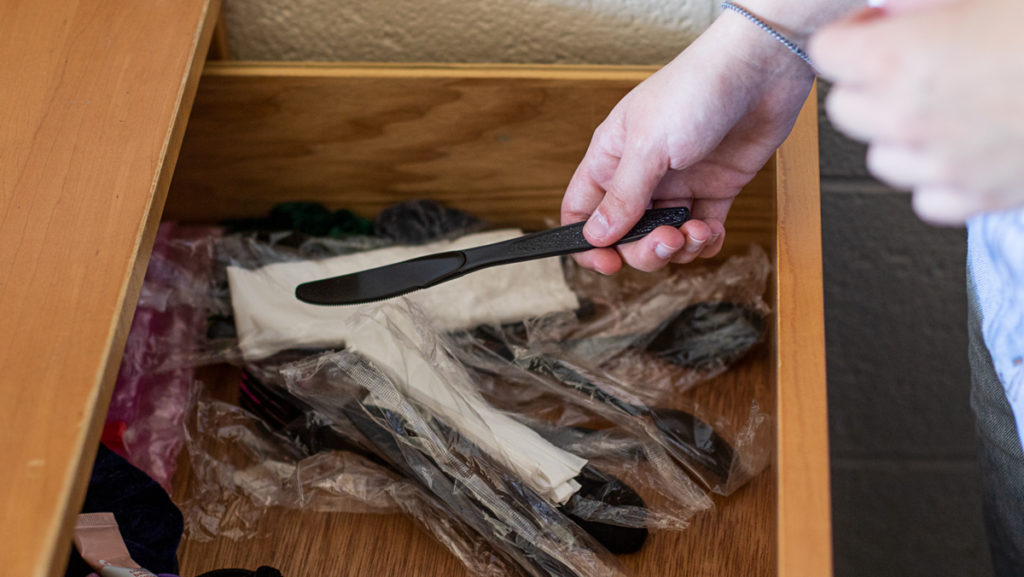When Ithaca College senior Absari Begum noticed the single-use plastics in the dining halls this semester, she said she thought the movement to use less plastic had been forgotten because of the COVID-19 pandemic.
In the past, Dining Services gave students reusable plates, cups and metal silverware in the dining halls. However, dining staff cannot wash those items anymore because of COVID-19 precautions. Students now get single-use plastic utensils, which are not compostable or recyclable, and plastic cups, which are compostable and recyclable, at the dining halls.
“Before COVID, we tried to be as environmentally friendly as possible,” Scott McWilliams, director of Dining Services, said.
This year, Dining Services has purchased approximately 159,250 plastic silverware kits, McWilliams said. He said that during the 2019–20 academic year, the college purchased 14,000 plastic knives, 43,000 plastic forks and 47,000 plastic spoons. Before the pandemic, the college used individual plasticware rather than all-in-one kits, he said.
He said Dining Services’ goal is still to source as many sustainable plastic alternatives as it can. He said the college sources environmentally friendly alternatives first, like the compostable and recyclable cups. If alternatives cost too much or are unavailable, the college orders less sustainable products, as it did with the non-recyclable silverware, McWilliams said.
Worldwide, 300 million tons of plastic waste is produced annually, with single-use plastics accounting for half of that, according to the United Nations Environment Programme (UNEP). Plastics are made from nonrenewable fossil fuel sources like oil, natural gas and coal, and most plastic waste ends up in landfills, dumps or the natural environment. Due to the COVID-19 pandemic, demand for flexible packaging, which includes single-use plastics, has increased by approximately 4–5% in the United States.
The UNEP states that plastics in the environment break down into tiny pieces that fish and other animals eat. Humans consume plastic when they eat fish and meat that has been contaminated with it. Plastic waste can also increase the transmission of diseases like malaria because it can clog sewers and provide places to breed for mosquitos, the UNEP states.
Susan Allen, professor in the Department of Environmental Studies and Science, said students could bring their own silverware instead of taking the plastic utensil kits to reduce plastic waste.
“We’re doing everything we can to prevent the spread of COVID,” she said. “That’s great. I’m all for it, but it doesn’t necessarily mean that we have to use single-use plastics. We can just provide our own.”
McWilliams said students could bring their own silverware with them to the dining hall and wash it themselves after they leave. Students could bring their own beverages, he said, but to prevent the spread of COVID-19, the dining hall staff cannot fill students’ own cups or water bottles for them.
Students like Begum have noticed the increase in single-use plastics in the dining halls and have tried to reduce their use of them. Begum said she tends to make her own food, so she avoids the single-use plastics in the dining hall that way.
Rebecca Evans, campus sustainability coordinator for the Office of Energy Management and Sustainability, said she would usually recommend that students eat in the dining halls in order to decrease their waste on campus. In the dining halls, students avoid extra packaging by receiving their food in reusable plastic containers, despite the single-use utensils.
Restaurants often give customers their takeout food in disposable cardboard boxes and plastic bags and with single-use plastic silverware, Evans said, and food packaging in grocery stores also amounts to a lot of waste.
“I think that the dining hall is actually still the best bet,” Evans said.
Freshman Haley Bracken said she does not take the single-use utensils when she picks up food from retail dining options like Ithaca Bakery. She said she typically brings those meals back to her room where she has her own silverware.
“We already get the containers,” she said. “Why not use reusable utensils?”
The use of single-use plastic has increased beyond the college as well. According to a 2021 article in the Chemical Engineering Journal, the pandemic has led to a preference among producers and consumers for single-use food packaging.
Demand on plastics for packaging is expected to increase by 40% throughout the pandemic, the article said.
“Hopefully we’ll return to some sense of normalcy that we’ll be able to get back and be more environmentally friendly than we currently are,” McWilliams said.








